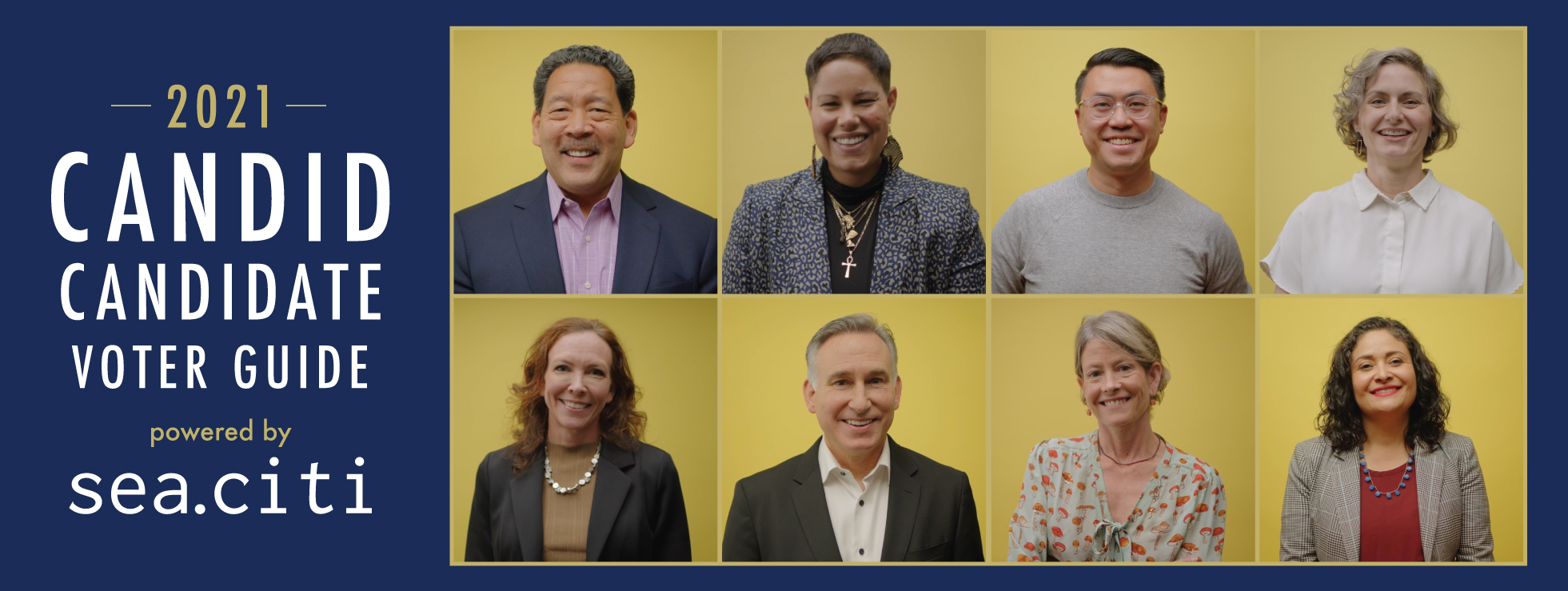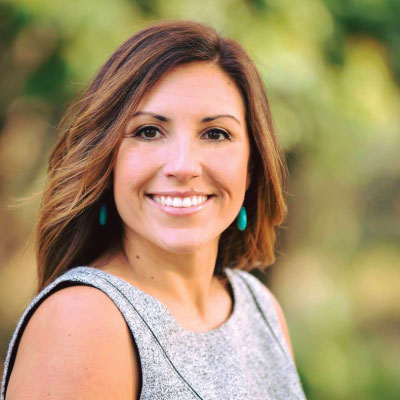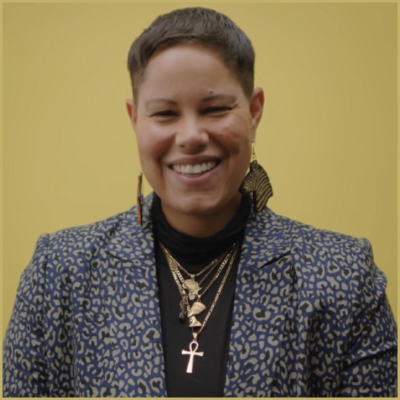
sea.citi is how tech and the community collaborate for results. We connect the tech industry with nonprofits and local governments to build a thriving and inclusive community.
We will not endorse candidates, or even suggest how you should vote on candidates or issues but will help explain key aspects of your ballot so you can use your time making your decisions instead of deciphering your ballot.
Make sure your voter registration is up to date and return your ballot by November 2nd.
MEET the candidates
Mayor of Seattle
Mayor Durkan announced in February that she would not run for a second term. With no incumbent, 15 candidates piled into the primary. The top two vote-getters from the primary, Bruce Harrell and M. Lorena Gonzalez both tout their long histories on the City Council as to why they are ready for the city’s top job.
What does the Mayor do? The Mayor of Seattle is the executive of the City of Seattle. The Mayor manages over 15 city departments and sets the tone and direction of the City’s budget and policy priorities. The City employs 11,000 people and a $6.64 billion annual operating budget and a $1.1 billion budget for infrastructure improvements. Most of the City’s budget is for ‘rate payer’ services like garbage, water, sewer, and electricity (which is one of the ‘greenest’ in the US). The Mayor is responsible for managing police, fire, emergency management, parks, libraries, transportation, and so much more.
Bruce Harrell

Bruce Harrell grew up in the Central District, attended Garfield High School, and was a star football player at UW. Harrell is an attorney who served on the Seattle City Council from 2007 to 2019.
Accomplishments on City Council:
- Supported the $15 minimum wage and worked to address the structural inequities in our public schools.
- Sponsored ‘ban the box” legislation to prevent discrimination in housing and employment for formerly prosecuted individuals.
- Advocated for police accountability measures including body cameras.
Endorsements: The Seattle Times, Washington Technology Industry Association, Metropolitan Democratic Club of Seattle, Seattle Fire Fighters Union, Congressman Adam Smith
Campaign Funds Raised: $1,152,961 including 21,038 democracy vouchers (as of 10/19)
Outside PAC spending: $1,309,003 (Funded by large contributions from individuals and corporations)
Primary Election Results: 34% – 69,612 votes
Critics say Harrell would be a status quo caretaker and despite 12 years on the City Council, he doesn’t have a very deep legislative record.
Learn more at bruceforseattle.com
M. Lorena González

Lorena González grew up in a migrant farmworker family in Central Washington, attended community college and WSU. González is a civil rights attorney and was elected to the Seattle City Council in 2015.
Key accomplishments on City Council:
- Led city council efforts to pass paid family leave, expanding pre-K, increasing protections for sexual abuse victims, expanding LGBTQ rights, election reforms, and pandemic assistance for small businesses.
- Sponsored secure scheduling law to stabilize schedules for hourly workers and goes after wage theft.
Endorsements: The Stranger, Publicola, King County Democrats, MLK Labor, Sierra Club, Senator Bernie Sanders, and Congresswoman Pramila Jayapal
Campaign Funds Raised: $916,040including 25,700 democracy vouchers (as of 10/19)
Outside PAC spending: $996,860.72(Funded by labor unions like UFCW 21, Unite Here Local 8)
Primary Election Results: 32% – 65,750 votes
Critics say González is further left than Harrell and would alienate business-centric policies.
Learn more at lorenaforseattle.com
Still can’t decide? Here are more resources on the Mayor’s race:
- Seattle Times: City Council careers show how mayoral candidates M. Lorena González and Bruce Harrell have served Seattle
- Seattle Times: Legal careers: How Seattle mayoral candidates Bruce Harrell and M. Lorena González practiced law
- Seattle Times: Seattle mayoral candidates clash on zoning and encampments in homelessness debate
- Seattle Times: Firefighters, Democratic Party groups make picks in Seattle mayoral race as PACs rake in cash
- Geek Wire: Interview: Seattle mayoral candidates on tech, talent, taxes, startups, homelessness, and favorite apps
- South Seattle Emerald: The 2021 Seattle Mayor’s Race by the Numbers
- Seattle Times: Seattle mayoral candidates Bruce Harrell, M. Lorena González debate approaches to policing, public safety
Seattle City Attorney
12 years ago, City Attorney Pete Holmes defeated the sitting City Attorney incumbent on a platform opposing the war on drugs and “against law-and-order rhetoric common at the time.” (Crosscut). Times sure have changed. In the race for his 4th term, Holmes was defeated in the August primary by two opponents and will not be on the ballot in November. The candidates on your ballot couldn’t be more different. It’s a matchup between Ann Davison who ran last year for Lt. Governor as a Republican and Nicole Thomas-Kennedy, a public defender who is a prison abolitionist.
What does the City Attorney do? The City Attorney leads the city’s Law Department (with 100+ attorneys and legal staff) and supervises all city-involved litigation as legal advisor, litigator, and municipal prosecutor on nearly 12,000 civil and criminal litigation matters every year. The City Attorney’s office handles civil litigation (non-criminal issues like environmental protection, land use, employment, regulatory enforcement, property damage, etc). The office only handles misdemeanors in criminal cases (DUIs, domestic violence, shoplifting, etc.) and not felonies like major crimes. The King County Prosecutor, a separately elected non-partisan office, prosecutes all of the cities felonies: the most serious crimes like murder, rape, burglary, kidnapping, arson, etc.
Nicole Thomas-Kennedy

Nicole Thomas-Kennedy moved to Seattle at 22 where she completed her GED and attended Seattle Central Community College. Thomas-Kennedy attended law school with an infant and is a public defender where she worked on over 600 civil and criminal cases.
Positions:
- Believes the City Attorney’s office has been over prosecuting low-level misdemeanor crimes.
- Would halt misdemeanor prosecutions of thefts and other offenses ‘borne out of poverty and addiction’.
- Funds should be shifted from policing to community-based responses – like mental health treatment.
Endorsements: The Stranger, King County Democrats, SEIU 775, The Urbanist, Seattle City Councilmembers Teresa Mosqueda and Tammy Morales.
Campaign Funds Raised: $336,598 including 13,501democracy vouchers (as of 10/19).
Primary Election Results: 36.39% – 71,367 votes
Thomas-Kennedy’s commitment to end misdemeanor prosecutions “would make the people of Seattle less safe and put our neighborhoods more at risk.”
Learn more at ntk4justice.com
Ann Davison

Ann Davison moved to Seattle in 1996 and worked for the Sonics in basketball operations. Davison has practiced law in Seattle since 2006 focusing on sports, business, employment, and other civil areas. Davison previously ran for Seattle City Council in 2019 and as the Republican candidate for Lieutenant Governor in 2020.
Positions:
- Believes the City Attorney’s office is too soft on crime and that failing to address low-level crime, disorder or uncleanliness has led to more serious crimes (like murder, rape, & assault).
- Criticizes the city for inaction on public disorder including chronic offenders including homeless encampments.
Endorsements: The Seattle Times, Seattle Building and Construction Trades Union, Former Governors Gregoire and Locke.
Campaign Funds Raised: $311,971 including 7,877 democracy vouchers (as of 10/19).
Outside PAC Spending: $323,550 has been raised by businesses, executives, and downtown property owners in opposition to Thomas-Kennedy.
Primary Election Results: 32.72% – 64,179 votes
Critics say that Davison is a more conservative candidate that is running on fear, doesn’t have any criminal law experience, and is inaccurately describing the duties of the job.
Learn more at neighborsforann.com
Still can’t decide? Here’s more information about the race:
- West Seattle Blog: Seattle City Attorney candidates face off on homelessness
- Crosscut: Seattle city attorney election: What’s at staker
- Crosscut: Seattle city attorney’s race: A stark choice marks the 2021 ballot
Seattle City Council Position 8
The Seattle City Council has a huge role in our day to day lives from how we get around to how we care for the most vulnerable people in our community. This year we are voting on 2 city-wide positions (the other 7 seats are district-based and will be on your ballot in 2 years).
Position 8 incumbent Teresa Mosqueda was first elected to this at-large position in 2017. Mosqueda won the primary election with nearly 60% of the vote. Her closest opponent to make it through the primary is Kenneth Wilson who received 16% of the vote.
Teresa Mosqueda

Mosqueda grew up in the Pacific Northwest and is a third-generation Mexican-American. Prior to her election to the City Council in 2017, she worked at the Children’s Alliance and the Washington State Labor Council, AFL-CIO.
Accomplishments on City Council:
- Led the ‘JumpStart’ Seattle plan – the payroll tax on corporations to fund affordable housing and homelessness resources.
- Led the passage of the Domestic Workers Bill of Rights and hazard pay for grocery workers
- Secured $40 million + to support small businesses to respond to COVID.
- Chaired the City’s Housing Committee and supports a denser city and has secured hundreds of millions for more affordable housing development.
Endorsements: The Stranger, MLK Labor, Sierra Club, Alliance for Gun Responsibility, King County Democrats, Seattle Education Association, Senator Bernie Sanders, and Congresswoman Pramila Jayapal.
Campaign Funds Raised: $255,163 including 7,884 democracy vouchers (as of 10/19)
Primary Election Results: 59.37% – 112,052 votes
Learn more at teamteresa.org
Kenneth Wilson

Wilson is a structural engineer who was involved in the new Northgate pedestrian bridge engineering.
Positions:
- Believes the West Seattle Bridge should structurally be open to one lane of traffic.
- Is not supportive of funding tiny house villages and believes funding would be better spent on long-term solutions.
Endorsements: None listed.
Campaign Funds Raised: $79,530 (as of 10/19)
Primary Election Results: 16.21% – 30,862 votes
Learn more at kenforcouncil8.com
Still can’t decide? Here’s more information about the race:
Seattle City Council Position 9
The Seattle City Council has a huge role in our day-to-day lives from how we get around to how we care for the most vulnerable people in our community. This year we are voting on 2 city-wide positions (the other 7 seats are district-based and will be on your ballot in 2 years).
Position 9 incumbent M. Lorena González is running for Mayor leaving position 9 vacant.
Nikkita Oliver

Oliver (they/them) moved to Seattle in 2004 and is a community organizer, attorney, and currently serves as the Executive Director of Creative Justice. Oliver ran for Mayor in 2017.
Positions:
- Believes city spending on criminal justice and police is too much, wants to reinvest in culturally responsible community-led care.
- Supports large investments in environmental justice and affordable housing which she believes should be funded by taxes on the wealthy.
- Calls for free and universal public transit and opposes clearing homeless encampments.
Endorsements: The Stranger, The Urbanist, MLK Labor, Washington Conservation Voters, Congresswoman Pramila Jayapal
Campaign Funds Raised: $397,500 including 11,536 democracy vouchers (as of 10/19)
Outside PAC spending: $48,236 from the Civic Alliance for a Prosperous Economy PAC.
Primary Election Results: 40.18% – 79,799 votes
Critics say that Oliver’s plans to cut police funding won’t improve public safety and proposed investment would cost too much.
Sara Nelson

Nelson moved to Seattle to attend graduate school in anthropology at UW. Nelson later served as a legislative aid to former City Councilmember Richard Conlin and with her husband owns Fremont Brewing. Nelson ran for Council position 8 in 2017.
Positions:
- Believes that everyone who calls 911 should receive a fast and fair response and current leadership has weakened public safety.
- Opposes the ‘JumpStart’ payroll tax and the proposal to cut police funding.
- Supports an audit of homeless spending before any new revenue is considered.
- Economic recovery and supporting small businesses is her top priority.
Endorsements: Seattle Times, Seattle Fire Fighters Union, Former Governor Locke
Campaign Funds Raised: $511,710 (as of 10/19). Nelson opted out of participating in the democracy voucher program.
Outside PAC spending: $36,402 from the Seattle Fire Fighters PAC.
Primary Election Results: 39.47% – 78,388 votes
Critics say that Nelson represents the status quo and will too strongly consider business interests in decision-making.
Still can’t decide? Here’s more information about the race:
- Seattle Times: Co-owner of Fremont Brewing, Sara Nelson, running for Seattle City Council again
- Seattle Times: Public safety Q&A with Nikkita Oliver and Sara Nelson, Seattle City Council candidates, Position 9
- Seattle Times: Nikkita Oliver announces run for Seattle City Council, lays out vision for big changes
- Crosscut: Seattle’s District 9 race: How Oliver and Nelson’s visions diverge
King County Executive
King County Executive Dow Constantine is running for his fourth term as King County Executive and is being challenged by State Senator Joe Nguyen. This is Executive Constantine’s first election with a serious challenger since he was elected to the position in 2009.
What does the King County Executive do? King County has a nearly $12 billion biennium budget that runs our Metro Buses, our jails and criminal justice system, administers many of our direct services to our homeless neighbors, our public health programs (COVID response), and our wastewater treatment plants. King County is home to over 2 million people and is the largest metropolitan county in Washington by population, number of cities, and employment. It is the 12th most populous County in the US.
Dow Constantine

Constantine was born and raised in West Seattle and attended UW for undergrad, graduate, and law school. He was elected to the State House of Representatives in 1996, the State Senate in 1997, and appointed to the King County Council in 2002. In 2009, Constantine was elected County Executive.
Constantine had a strong showing in the primary election and is generally perceived as a strong and effective executive. Constantine has been nationally recognized for his strong leadership through the COVID-19 pandemic.
Accomplishments as Executive:
- King County Public Health and Constantine’s leadership in responding to the covid pandemic has been lauded as the best in the US for containing the virus.
- Led the creation and passage of Sound Transit 3 – the $54 billion light rail expansion measure, and developed and passed Best Starts for Kids measure.
- Oversaw the population of the juvenile detention facility decrease from 80 when he took office to 24 and has pledged to close the facility by 2025.
Endorsements: The Seattle Times, MLK Labor, Alliance for Gun Responsibility, Governor Inslee, Seattle Fire Fighters
Campaign Funds Raised: $1,803,808.15 (as of 10/19)
Primary Election Results: 51.86% – 241,478 votes
Critics say that Constantine has been Executive for 12 years and it’s time for new leadership that is bolder and more aggressive on our region’s biggest challenges.
Learn more at dowconstantine.com
Joe Nguyen

Nguyen grew up in White Center and is the son of Vietnamese refugees and cites a lived experience that is deeply rooted in the community that prepares him for this position. Nguyen attended Seattle University and is a program manager at Microsoft. Nguyen was elected to the State Senate for the 34th District in 2018.
Nguyen has made waves as the “AOC” of Washington and touts his progressive policies in the legislature. This is a fun race to watch – a talented upstart challenging a long-serving well-regarded and effective executive.
Priorities:
- Supports a wealth tax on richest county residents to fund free public transit and more aggressive funding for affordable housing.
- Supports closing the new youth jail and justice center, and believes the funding to build the facility should have been spent on more effective intervention services.
- Acknowledges that many positions are similar to the incumbent, he believes that more urgency is necessary to address the region’s many challenges.
Endorsements: The Stranger, The Urbanist, Run for Something, State Rep Kirsten Harris-Talley
Campaign Funds Raised: $211,357.09 as of 10/19)
Primary Election Results: 32.59% – 151,757 votes
Critics say that Nguyen is an effective state Senator but hasn’t made a strong case for why he’s prepared to lead the county better than the incumbent.
Learn more at meetjoenguyen.com
Still can’t decide? Here’s more information about the race:
- Seattle Times: For the first time in years, there are 2 serious candidates for King County executive
- Seattle Times: Dow Constantine leads in King County executive primary, Joe Nguyen trails
- New York Times: Seattle’s Virus Success Shows What Could Have Been
- Crosscut: King County elections 2021: What’s at stake and why it matters
Voting Resources
Be sure your voter registration is up to date! www.vote.wa.gov
Your ballot should arrive around October 13th be sure to return your ballots by November 2nd! No postage is necessary, or take your ballot to a ballot dropbox near you.
- If you haven’t received your ballot, get in touch with King County Elections elections@kingcounty.gov or 206-296-VOTE (8683).
- If you’re still not registered, you can do it in person until November 2 (see #3 on this list)
- If you need to update any information like your address or signature KC Elections website has it all.
- King County lets you track your ballot, so you can confirm once it has been received and counted.
- If you are out of town and won’t have access to your mail, you can mark and print your ballot here.
- You can find the full text of all the measures on your ballot here.
What is your vision for the future of working in Seattle?
sea.citi promotes civic engagement in the local tech sector by building relationships between community, government, and innovation workers. Earlier this year, we conducted a survey of Puget Sound Tech workers to ensure we are building stronger collaboration between tech and community.
Our survey showed that 8 in 10 tech workers anticipate working from home at least 2 days a week in the future. We asked all the candidates what this shift means for Downtown and across the region. Here’s what they said:
—–
Thank you Madrona Bureau for your most excellent video production skills.

